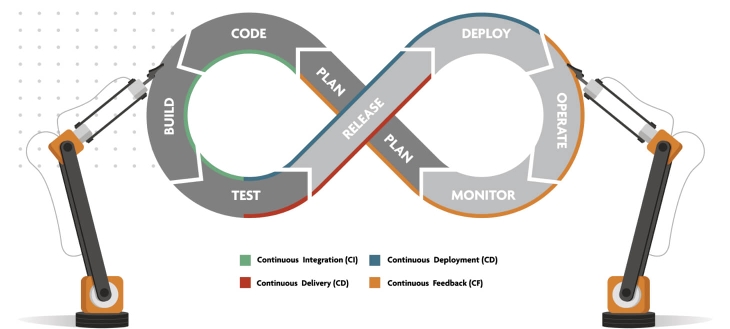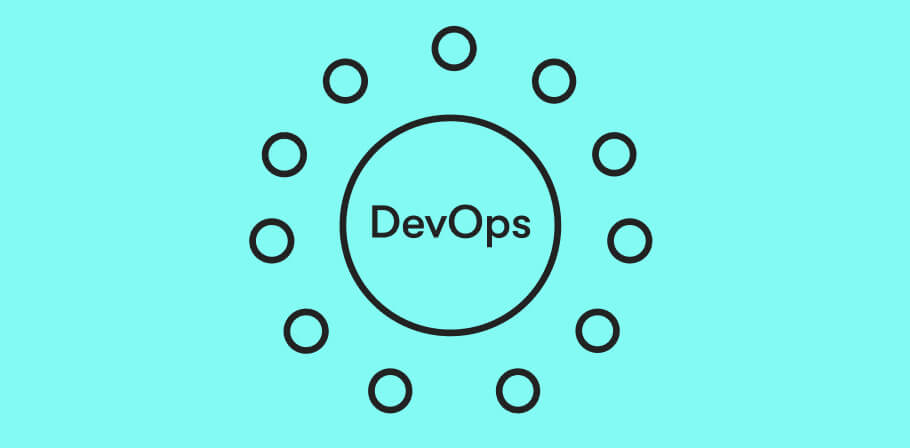DevOps as a service is a provisioning of DevOps under the managed services model, which is crucial for fast deployments and maintaining an efficient pipeline. As an approach to software development, it allows companies to produce better software via collaborative organizational improvements.
But not everyone has the resources to introduce DevOps into their infrastructure, or to do it well. As a result, DevOps service providers have expanded their outreach, offering unique DevOps as a service (Daas) support to those who need DevOps but cannot introduce the methodology correctly on their own.
Daas providers are highly beneficial for capturing the transformative aspects of DevOps. So let’s explore all you need to know about DevOps and DevOps as a service.
HIRE VETTED DEVOPS EXPERTS AT EPAM STARTUPS & SMBS
We’ll take care of your entire DevOps transformation so you can benefit from better, faster, and more reliable software delivery processes.
What is DevOps?
DevOps is a software development methodology that combines developers (dev) with operations (ops). It leverages tools, practices, and set principles that instill a cultural mindset of integration. Unified teams result in a robust and efficient software development lifecycle — one of the primary DevOps methodology goals.
In addition, by removing silos common to the tech industry, DevOps creates more holistic operations designed for velocity. Continuous integration and delivery allows projects and teams to earn rapid incremental releases, because the roles of administration and development have been melded together.
The DevOps methodology posits four tenets that will improve your organization's development practices:
- Automation: Manual execution with physical hand-offs are time-consuming. Human effort often results in slow releases or updates. With automation, all pipeline processes that do not require intervention are able to speed up (i.e testing), leading to greater flexibility and velocity.
- Holistic collaboration: Developers focus on code while operations improve processes. Without teamwork, the two parties will distance themselves into silos, and communication will break down. DevOps remedies that split, leading to capable and informed team members who can execute on strategy.
- Efficiency: DevOps measures performance to locate areas that need improvement, including company-wide practices. If new tools or systems can increase velocity, then DevOps engineers spend resources to capitalize on that advantage.
- Feedback: Management that does not listen to the remarks of all stakeholders, both developers and customers, will struggle to deliver products according to user satisfaction. DevOps includes robust feedback loops with all parties to help deliver releases that meet client standards.
What are the benefits of DevOps?
Organizations that adopt the methodology gain multiple DevOps benefits:
Stable work environments
Not only will your software receive a boost in reliability, but the entire company’s work environment will become grounded through well-balanced DevOps practices. Tensions that arise from system bottlenecks thwart productivity. Therefore, leveraging DevOps principles can create an office culture that features happy and effective teams.
Product quality improvements
Increased collaboration and the inclusion of feedback cycles will result in direct improvements in release quality. For example, automated continuous testing will catch errors at speed, leading to bug-free releases with no loss of pipeline velocity.
Innovation
Traditional IT structures suffered from management bottlenecks, a lack of transparency, and little buy-in from stakeholders. Such conditions stifled innovation and significantly ballooned costs. With DevOps, automation and collaborative teams have the room to pursue integrated work that boosts innovation.
Lowered costs
When utilized properly, DevOps will transform your entire management and department setup. Repurpose ineffective and inefficient elements until all company levels operate in a streamlined manner. Expect costs to decrease through the elimination of context switching and disparate processes.
Productivity increases
Get more for less. A well-functioning pipeline is flexible, making it far easier to integrate changes or adjustments. This is where developers can make rapid deployments. As a result, your firm's productivity will skyrocket and gain a competitive market advantage.
Better resource utilization
Automation and agility lower management responsibilities, which frees employees to engage in more beneficial work. In turn, resources are better controlled. Couple such advancements with continuous delivery to earn a far higher return on investment.
Faster problem resolution
A company culture that allows for experimentation, failure, and feedback not only locates problems faster but has the methods and systems to swiftly fix any errors. As a bonus, such a learning mindset leads to better employee engagement and retention.
TAKE ADVANTAGE OF DEVOPS BENEFITS WITH EPAM STARTUPS & SMBS
EPAM Startups & SMBs offers complete DevOps services, providing you with a simple way to implement DevOps within your organization. Access DevOps experts who will facilitate the transformation.
Is DevOps the same as agile?
Agile and DevOps have many similarities, however they are not the same. Even though many regard DevOps as an offshoot of agile, this is actually just a perspective intended to improve on agile’s positive aspects.
DevOps and agile similarities
Agile involves continuous iterations within the software development lifecycle, yet approaches the task through incremental design. Elements are composed of smaller iterative pieces that integrate into a seamless pipeline. DevOps takes many of these core agile concepts and repurposes them over more holistic methods.
For example, DevOps and agile both help introduce fast and flexible responses to changes and adjustments. Both methodologies hold collaboration as a core principle. Both also ensure that interactions between disparate teams are more important than processes. DevOps and agile connect over the common goal of rapid and efficient release cycles.
Differences between DevOps and agile
Although agile and DevOps have much in common, they are not identical.
For example, while both approaches value feedback, agile is more customer-centric (DevOps integrates feedback cycles from all stakeholders, not just the customer). Another example is that agile puts much more focus on software development, while DevOps is interested in fluid thinking dynamics related to deployments.
In short, agile remains a framework for delivery software, while DevOps is an organizational philosophy for achieving continuous deployments through the use of modern operations tools. DevOps stitches tools, tasks, values, and processes into one collaborative mindset, whereas agile is more of a development manifesto.

How is DevOps different from SRE?
Just as DevOps grew out of agile, site reliability engineering (SRE) expanded once the principles of DevOps took hold in the IT community. Traditionally, job roles involved a split production away from development, but DevOps helped to repair that divide.
With that bedrock of integration, many engineers started to advise, design, and improve upon the operations themselves. Code could automate not just the project but the tasks that operated the project itself. The results made it far easier to reliably scale a system, a primary benefit for any organization. SRE thus became its own engineering philosophy.
DevOps and SRE similarities
SRE principles and practices have quite a bit of overlap with the fundamentals of DevOps. They are not competing methods, but are two sides of the same coin with common principles:
- Holistic software lifecycles
- Faster product release timelines
- Emphasis on collaboration
- The removal of organization silos
- The breakdown of management bottlenecks and leadership barriers
- Principles of shared responsibility by all team members
When applied in tandem, both SRE and DevOps result in better management and the execution of complex distributed systems. For enterprises that hope to scale efficiently (and remain competitive), the two concepts are crucial for maintaining stability.
Differences between DevOps and SRE
The differences between DevOps vs SRE relate to the focus of each. DevOps remains a more open-ended philosophy that outlines principles related to an organization's culture. SRE, on the other hand, involves itself with the practical applications of those principles, and how they might apply to the end-users’ experience with a product. Consider SRE as the methods that help improve on how DevOps builds and deploys applications.
In particular, SRE remains more focused on the reliability of a system as it scales. The core principles inform engineers how they can better implement DevOps as expansion causes resource utilization to strain. Site reliability engineers can then ask themselves how they might accomplish a task faster, better, and more efficiently.
6 signs your organization needs DevOps
DevOps encompasses several best practices that facilitate an integrated work environment. If your organization suffers from the following six “red flags”, then you most likely could benefit from adopting DevOps:
- Deployments are minimal: In a healthy pipeline, release cycles are rapid, incremental, and continuous. Changes under DevOps are adaptable and flexible, leading to faster delivery. If your project experiences slow deployments, then DevOps is needed.
- Deployments are manual: While manual execution is necessary under certain circumstances, the majority of your pipeline should be automated (a key tenant in the DevOps approach). If not, then any deployment will likely be slow and filled with errors.
- Deployments are frequently delayed: DevOps continuously integrates all aspects of your pipeline. Such delivery is highly efficient, best demonstrated by regular code releases and connected testing. If your deployments continuously experience roadblocks, then you need DevOps.
- Communication is non-existent: DevOps places importance on cross-department cooperation, even for roles traditionally delegated separately. If you find that individuals remain siloed (leading to duplicate work, overspending, and organizational drift), then the continuous delivery that DevOps provides can offer tangible advantages to your company.
- No one knows the pipeline end goal: DevOps fosters a work culture of collaboration and transparency. If no one understands the central vision or purpose of a project, the throughput of work falls to the wayside. If your work environment places no value on business-oriented goals, then change is needed.
- Management offers no helpful feedback: Employees excel when they are allowed to fail and learn from their failures. With a well-functioning feedback loop, entire teams can locate and repair problems on their own. If constructive feedback is not an integral part of your organizational ethos, then you should look into how DevOps can optimize your organization.
If you want to learn the exact action steps to take for implementing DevOps into your organization, then read through our startup guide on implementing DevOps.
IT’S TIME TO INTEGRATE DEVOPS INTO YOUR ORGANIZATION
If you want a supercharged pipeline and a streamlined release cycle, our expert DevOps engineers can help you implement the core principles and best practices. Contact EPAM Startups & SMBs to access talent or to employ our consulting services for easy DevOps integrations.
What is DevOps as a service?
DevOps as a service is an application development philosophy. It is a delivery model for tools and processes that helps to practically facilitate the core principles of DevOps within an organization.
Because DevOps encompasses all aspects of the workplace environment, even the tools used to build, test, and deliver DevOps itself encompass the benefits of the methodology. Managed cloud-based services can contribute even more flexibility, speed, and collaboration within the software lifecycle.
In other words, the continuous delivery and cultural mindset of DevOps can also become a service provided by third parties. Many consider it the next generation of DevOps, as it helps organizations access the benefits of new IT frameworks without as much risk or upfront cost. It is far more economically feasible to outsource DevOps integrations from capable, equipped, and knowledgeable experts, rather than create an in-house transformative internal structure.
To expedite the service aspects, DevOps has entered the cloud. All tools and processes are housed in a cloud-based environment to gather the benefits of agility and flexibility. Your entire pipeline could be easily accessible by all departments (developers, testers, ops, SREs), with all necessary commercial deployment processes automated within. It is the ideal way to simplify all components related to the selection, maintenance, and management of all DevOps tools.

The DevOps-as-a-service pipeline
The DevOps-as-a-service process functions with eight distinct stages. Each stage helps continuously build and deploy code so that the delivery value is highest for the end customer. DevOps depicts the standard process as a never-ending infinity loop, where the fundamentals of continuity enable increasing rewards for collaboration.
DevOps as a service mirrors the DevOps process to provide unique tools for each stage. For example, continuous integration is a core principle of DevOps, and services will likely give access to tools (Jenkins or Github) that can streamline your code builds. Case in point: Jenkins can help save time and costs as it reduces the need for provisioning nodes.
Another example includes methods to improve continuous testing. Manual testing is costly and time-consuming, but with a DevOps service that provides rapid automation, the entire DevOps pipeline velocity increases as continuous testing integrates into the process. Additionally, the more shift-left testing principles that you incorporate, the easier it is to locate and fix bugs earlier in the process.
6 key reasons to outsource DevOps
There are several advantages gained when you outsource your DevOps implementation:
- Access senior talent: DevOps service providers like EPAM Startups & SMBs have strong relationships with experienced specialists. Coupled with a refined recruitment process, you can have experienced DevOps engineers working on implementation from day one. Save time and additional costs with minimal training and onboarding.
- Increase delivery speed: Outsourcing services take on tasks that streamline your development cycle. From installing organizational infrastructure for continuous testing, to reframing team strategy for cross-functional production, engineers with up-to-date tools provide direct value within the software lifecycle. New talent can also inject innovative knowledge into your pipeline.
- Reduce human resources risks: Remote team providers take on the full-cycle human resources administration. Therefore, issues with taxes, licenses, software integrations, and office space all fall by the wayside. Hire for the exact job requirements and duties, and worry less about direct management or development monitoring. Select from a pool of candidates and hire only those who fit well into the company culture. Labor and investment risk then decrease as a result.
- Lower expense: It is far more cost-effective to turn to DevOps-as-a-service companies rather than setting up the entire team in house. These companies can provide a specific skill, such as DevOps-as-a-service with AWS, for specific tasks at price points far more attractive than internal hires needing professional development.
- Increase collaboration: Most DevOps service providers work directly to remove silos and enhance teamwork aspects. Additionally, many of them provide complete teams of specialists with every competency covered. Expertise is shared, helping to upskill other team members through peer learning. Failure and experimentation are valued, leading to a more progressive work environment.
- Reduce critical business resource usage: With the support of a DevOps service provider, you will gain more time to focus on business-critical operations. Let experts control development aspects and software delivery so you can concentrate on company growth and role responsibilities.
WHAT ARE YOU WAITING FOR?
DevOps as a service can radically change the scale and efficiency of your company, all with minimal risk and cost. Take advantage of our DevOps Services to rapidly integrate the latest iteration of IT infrastructure.
Do you need DevOps consultants or engineers?
The unique requirements of your project will determine whether you need DevOps consultants or engineers. When choosing, it is best to consider who can drive the most benefits to your organization, as both roles offer distinct advantages.
- DevOps consultants provide more high-level and strategic DevOps planning, helping to direct teams and share knowledge about DevOps implementation.
- DevOps engineers provide tangible support as they establish infrastructure in a predetermined DevOps process.
Both roles involve considerable overlap, especially if you hire a vetted specialist with highly regarded DevOps engineer skills. Still, a consultant is ideally the first step for companies considering a wholesale internal change. An expert who can facilitate the shift into a DevOps culture is a helpful resource, especially as most businesses need a return on investment above what the traditional roles of administrator, developer, and operations currently achieve.
In addition, if you intend to leverage cloud-based environments, you may need to plan for the additional service requirements that could require a cloud engineer rather than a DevOps engineer. There are several primary differences between DevOps consultants and DevOps engineers, so evaluate the demands of your project and who might best serve your needs.
How can DevOps as a service transform your organization?
There are several success metrics and Key Performance Indicators (KPIs) that all DevOps-as-a-service companies will measure to track tangible improvements to your pipeline:
- Deployment speed: The frequency, rate, and success of deployments
- Cycle lead times: The length of time it takes to create or edit new code
- Change success: The number of changes, how often those changes failed, and issues with problematic deployments
- Defect rates: How many defects are pushed into production, the total volume of bugs, and the speed of identifying bugs
- Application performance: Customer ticket tracking, real-life uptimes, and response times
By tracking data and implementing fixes related to the quality of your pipeline, projects, and deployments, you can make tangible changes to operations and tools or commit to problem-solving. Over time and through non-stop readjustment to the core principles of DevOps, your entire pipeline velocity and stability will increase alongside a complete overhaul of the work environment itself.
Your first step: choosing the DevOps service provider
There are numerous DevOps service providers to select from, each with a unique approach to DevOps integrations and project development. Consider whoever you hire as a technical partner, as they will become a crucial part of your organization's makeup and overall structure.
Interested in learning more about our DevOps services? EPAM Startups & SMBs is happy to work with you and prove that we are the service provider of choice.
LET’S START YOUR DEVOPS JOURNEY TOGETHER

Since 2011, Dmitri has been helping business readers navigate the technology market through expert analysis and editorial work. At EPAM Startups & SMBs, Dmitri shows startups and SMBs across industries how to drive business value from their software engineering investments.
Since 2011, Dmitri has been helping business readers navigate the technology market through expert analysis and editorial work. At EPAM Startups & SMBs, Dmitri shows startups and SMBs across industries how to drive business value from their software engineering investments.
Explore our Editorial Policy to learn more about our standards for content creation.
read more


















